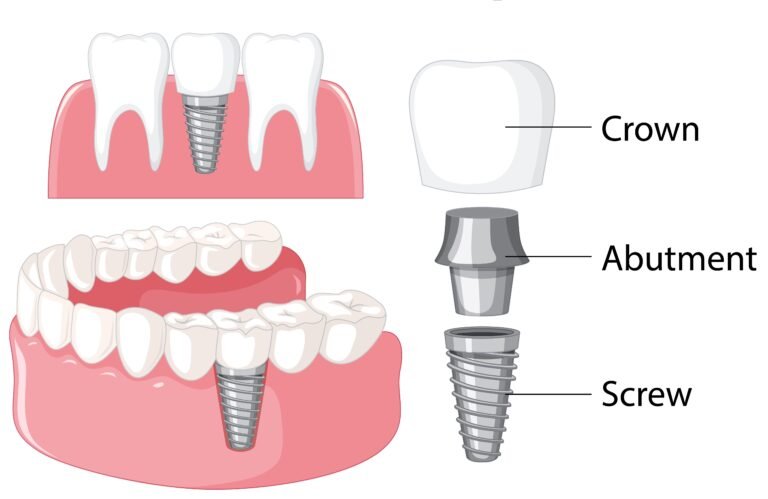
Dental implants are a popular treatment for replacing missing teeth. They give a natural appearance, improve chewing function, and help in maintaining bone health in the long-term. However, this is possible only with the careful selection of components used in the procedure. In a dental restoration system, there are two important components:
- Abutment: It is a connector between a dental implant and a prosthesis, such as a crown, dental bridge, or denture.
- Crown: It is a tooth-shaped cap that is fixed to a tooth to restore its shape, size, strength, and appearance.
The choice of the abutment and crown largely affects the success of the implant restoration. In this article, we’ll help you understand what custom abutment and screw-retained implant crowns are and how to make a choice between them.
Custom Abutment
Custom abutments are precisely designed to fit the unique implant site of the patient, which allows for seamless integration between the implant and the final restoration. These abutments are milled from materials like titanium, zirconia, or gold-colored noble metals, to give a more personalized fit for the unique anatomy of the patient’s mouth. Also, these can support a dental crown well, which is the visible portion of the tooth restoration.
Custom abutments offer a number of benefits in dental restoration including superior fit, optimal aesthetics, and versatility to address challenging cases. One of the major benefits of custom abutment is that it preserves the soft tissue contours, which are important in the esthetic zone.
Before you make a decision, you must also be aware of the potential drawbacks. Custom abutments are costlier. Since they are custom-made, they need added time in designing and production.
Screw-retained implant crowns
A type of dental implant, a screw-retained implant crown is directly fastened to the implant abutment using a screw. Unlike their contemporary cemented-retained crowns which are fixed in place using dental cement, screw-retained crowns can be easily removed for maintenance or repair. Moreover, there is less risk of damage to the implant during repairs.
Screw-retained implant crowns are a reliable and convenient solution and are a preferred choice for the replacement of the rear teeth, and front teeth in specific cases.
Talking about the disadvantages of screw-retained crowns, one of the major concerns is the access hole for the screw, which may not look nice aesthetically, especially if it is in the front teeth. Plus, the access hole needs to be covered with a filling which may create a non-uniform appearance. Screw-retained crowns are more expensive and need frequent tightening and maintenance.
Conclusion
When choosing between custom abutment and screw-retained implant crowns or any other component, you must consider your aesthetic requirement, implant preference, clinical access, and budget. With the right choice, you can achieve a beautiful, functional and long-lasting dental implant restoration that’ll make you feel confident and happy. To find the best option for yourself, it is advised to discuss with your dentist and get their advice for your specific needs. If you are looking for a full service dental lab in Houston for your dental restoration, look nor further than Uptown Dental Lab & Milling Center. We use the highest quality material at the more affordable price. Talk to us to know more.
